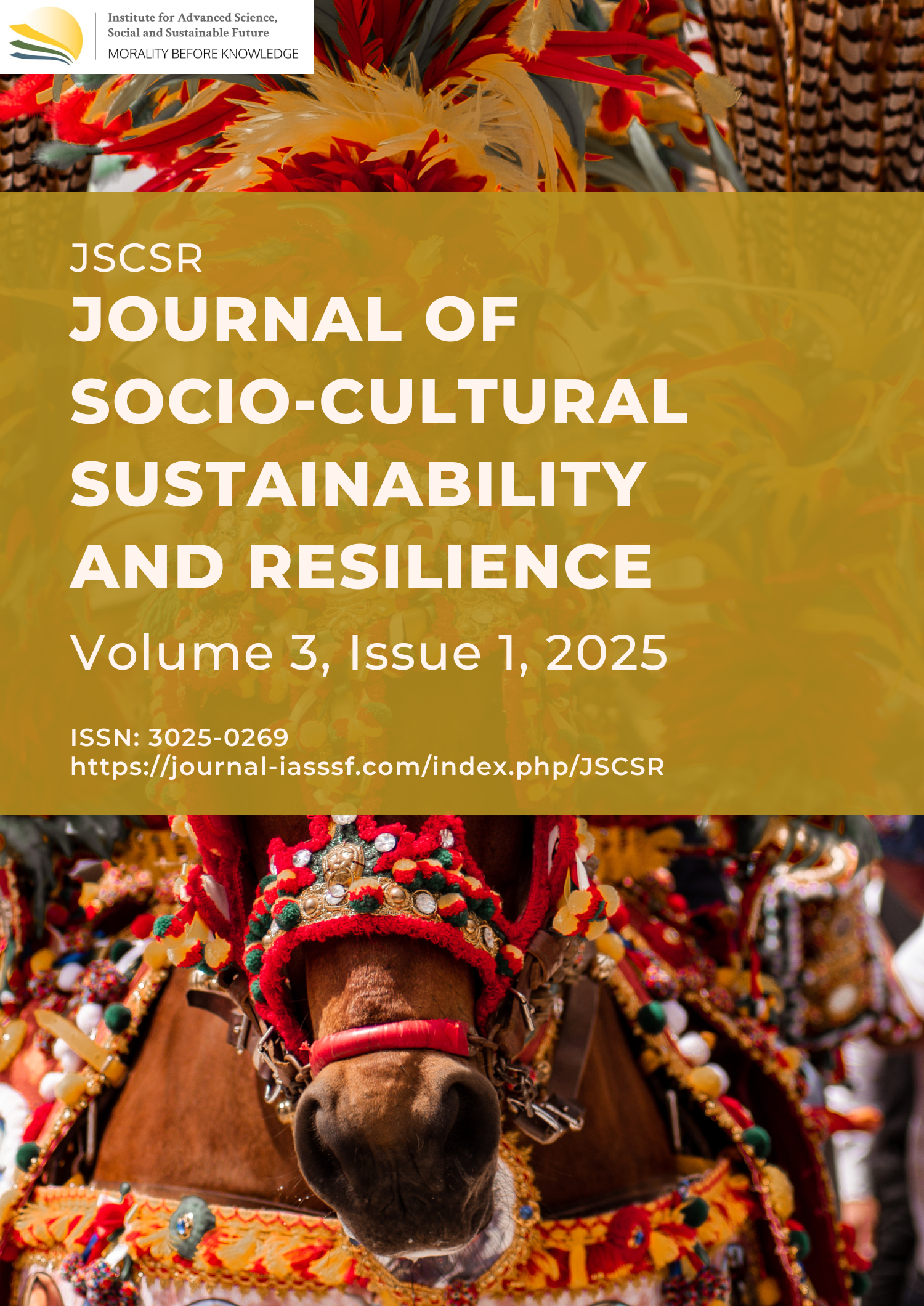The buying and selling of identity in the 2024 presidential debate: A cultural politics approach to media and hegemony
DOI:
https://doi.org/10.61511/jscsr.v3i1.2025.2216Keywords:
election, hegemony, ideology, identity, market for loyaltiesAbstract
Background: This article discusses the attempt to establish hegemony in the 2024 presidential election through the presidential candidate debates. The presidential election is an important event in the transition of government in a democratic country. Presidential candidate debates are often seen merely as a campaign stage, but few view them as a medium for establishing hegemony, or as a marketplace where the identity products of presidential candidates are traded for voter loyalty. This study aims to explain how hegemony is established through the 2024 presidential candidate debates and how the identities of each candidate pair are traded for voter loyalty. Methods: This research was conducted by applying the theoretical framework of the “market for loyalties” as a method of analyzing the buying and selling of political products through the media. This study employs qualitative critical discourse analysis using the “market for loyalties” framework with data from debates, regulations, media, and campaign materials to examine identity construction and hegemony. Findings: This article indicate that hegemony is established through the ideologies and narratives brought by each candidate pair and their coalitions. The government plays a role in limiting the public's perspective on ideologies to only three presidential candidate pairs through presidential debates broadcast via mass media and digital media. These ideologies are reflected in the identities of each candidate pair; candidate pair 01 represents religious identity and change; 02 represents youth identity, loyalty to Jokowi, and continuity; 03 represents the identity of the PDIP (Partai Demokrasi Indonesia Perjuangan) as the ruling party and incumbent. Conclusion: This study concludes that the 2024 presidential candidate debates function as a medium for constructing hegemony through the articulation of ideologies and identities exchanged for voter loyalty. Novelty/Originality of this article: This article lies in applying the “market for loyalties” framework to analyze presidential debates as arenas of hegemony formation rather than merely campaign platforms.
References
Abdurrohman, Y. (2024). Manajemen Impresi Prabowo Subianto dalam Menghadapi Pemilihan Presiden 2024. Komuniti: Jurnal Komunikasi dan Teknologi Informasi, 16(1), 41-74. https://doi.org/10.23917/komuniti.v16i1.3768
Al-Arif, M. N. R. (2024). Narasi “Melanjutkan” lebih Menarik Suara pemilih. detiknews. https://news.detik.com/kolom/d-7195158/narasi-melanjutkan-lebih-menarik-suara-pemilih
Althusser, L. (2024). Ideology and ideological state apparatuses: Notes towards an investigation. In New Critical Writings in Political Sociology (pp. 299-340). Routledge.
Amalia, D., Tamara, L. F., Maharani, D. P., & Syahputri, F. I. (2024). Penerimaan Netizen Terhadap Citra Tokoh Politik Ganjar Pranowo Dalam Tayangan Adzan Di Televisi Pada Media Sosial Tiktok. Nusantara: Jurnal Ilmu Pengetahuan Sosial, 11(1), 263-276. http://dx.doi.org/10.31604/jips.v11i1.2024.263-276
Antony, C., & Candra, M. (2024). Personal Branding Mohammad Mahfud Md (Analisis Personal Branding Mahfud Md Dalam Pemilu 2024). Jurnal Relasi Publik, 2(1), 159-165. https://doi.org/10.59581/jrp-widyakarya.v2i1.2151
Asy'ari, H. (2023). Pemilu Serentak dan Keutuhan Bangsa. Komisi Pemilihan Umum. https://www.kpu.go.id/berita/baca/12022/pemilu-serentak-dan-keutuhan-bangsa
Bates, T. R. (1975). Gramsci and the Theory of Hegemony. Journal of the History of Ideas, 36(2), 351-366. https://doi.org/10.2307/2708933
Callister, P. D. (2017). Identity and Market for Loyalties Theories: The Case for Free Information Flow in Insurgent Iraq. https://scholarship.law.slu.edu/cgi/viewcontent.cgi?article=1268&context=plr
CNN Indonesia. (2024). Cak imin Anggap Warga Nu Kebangetan Jika Tak Pilih Dirinya di Pilpres. Nasional. CNN Indonesia.
Easton, D. (2017). A systems analysis of political life. In Systems research for behavioral science (pp. 428-436). Routledge.
Farisa, F. C. (2024, February 29). Survei Indikator: Kepuasan Publik Terhadap Jokowi Turun Jadi 76,6 Persen. KOMPAS.com. https://nasional.kompas.com/read/2024/02/29/12060191/survei-indikatorkepuasan-publik-terhadap-jokowi-turun-jadi-766-persen
Felluga, D. (2011) "Modules on Althusser: On Ideology." Introductory Guide to Critical Theory. Purdue U.
Gainous, J., & Wagner, K. M. (2014). Tweeting to Power: The Social Media Revolution in American Politics. Oxford University Press.
Gramsci, A. (2009). Hegemony, intellectuals and the state.
Hakim, A. B., & Sejati, S. P. (2024). Joko Widodo sebagai faktor penentu Pilpres 2024 dalam kemenangan paslon 02 Prabowo-Gibran. Ummul Qura Jurnal Institut Pesantren Sunan Drajat (INSUD) Lamongan, 19(1), 27-34. https://doi.org/10.55352/uq.v19i1.856
Harsono, A (2012). Leading change transforming leadership. Media Indonesia.
Harsono, A. (2007). Controlling power. Media Indonesia.
Hidayat, H., & Muksin, N. N. (2022). Public relations politik Ganjar Pranowo untuk membangun komunikasi politik di media sosial. Prosiding 16th URECOL: Seri Pendidikan dan Humaniora, 39-58.
http://www.purdue.edu/guidetotheory/marxism/modules/althusserideology.html
Ihsanuddin. (2024). Jokowi: UU Menyatakan presiden Punya Hak kampanye, Jangan Ditarik ke Mana-mana. KOMPAS.com.
Langman, L. (2015). An overview: Hegemony, ideology and the reproduction of domination. Critical Sociology, 41(3), 425-432. https://doi.org/10.1177/0896920515570208
Leitch, V. B., & Cain, W. E. (2010). The Norton anthology of theory and criticism. WW Norton & Company.
Marshall, A. (2009). Principles of economics: unabridged eighth edition. Cosimo, Inc.
McFate, M., Jackson, A. V. (2006). The Object Beyond War: Counterinsurgency and the Four Tools of Political Competition. Military Review. https://apps.dtic.mil/sti/html/tr/ADA489124/
Muhamad, N. (2023). KPU: Pemilih Pemilu 2024 Didominasi Oleh Kelompok gen Z Dan Milenial: Databoks. Indonesian Economic and Business Data Center. https://databoks.katadata.co.id/datapublish/2023/07/05/kpu-pemilih-pemilu-2024didominasi-oleh-kelompok-gen-z-dan-milenial
Price, M. E. (1994). Market for loyalties: Electronic media and the global competition for allegiances. Yale LJ, 104, 667.
Probowati, A. (2021). The leadership of ganjar pranowo. Universitas Muhammadiyah.
PSI. (2023). Memahami Jokowisme - Partai solidaritas Indonesia. Partai Solidaritas Indonesia - Hadir & Kerja untuk Rakyat. https://psi.id/memahamijokowisme/
Putri, R. M. M., & Ahmad, N. (2024). Peran Market Intelligence dalam Pencalonan Gibran Rakabuming Raka sebagai Calon Wakil Presiden di Pemilu. Jurnal Representamen, 10(01).
Sari, E. (2016). The Resurgence of Islamic Identity Politics in the Jakarta Governor Election Arena. KRITIS: Jurnal Ilmu Sosial dan Ilmu Politik Universitas Hasanuddin, 145-156. https://journal.unhas.ac.id/index.php/kritis/article/view/4164
Siregar, A. R. (2022). Survei Populi Center: 83,5 Persen Warga Jakarta Puas Dengan Kinerja anies. KOMPAS.com. https://megapolitan.kompas.com/read/2022/10/21/16140951/survei-populi-center-835-persen-warga-jakarta-puas-dengan-kinerja-anies
Taufani, M. R. I. (2024, April 5). RI's largest Islamic organization, NU or Muhammadiyah? CNBC Indonesia. https://www.cnbcindonesia.com/research/20240403160423128528006/organisasi-islam-terbesar-ri-nu-apa-muhammadiyah
Triantoro, D. A. (2019). Identity Politics Practices in Anies-Sandi Social Media Accounts. Jurnal Ilmu Komunikasi, 16(1), 19-40. https://doi.org/10.24002/jik.v16i1.1495
Utomo, W. W. (2023). Jokowism Between Political Ideology And Metaphors Of Power In Political Polarization In Indonesia. Jurnal Al-Harakah, 7-22. http://dx.doi.org/10.30821/alharakah.v0i0.19214
Downloads
Published
How to Cite
Issue
Section
Citation Check
License
Copyright (c) 2025 Muhammad Ammar Rasyad, Ari Harsono

This work is licensed under a Creative Commons Attribution 4.0 International License.
















